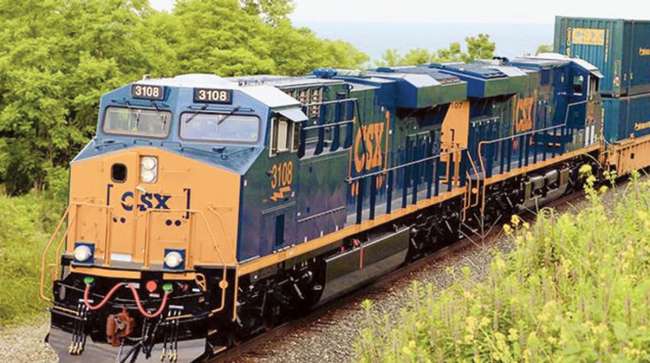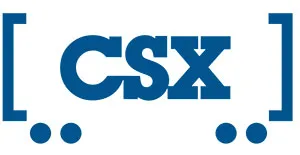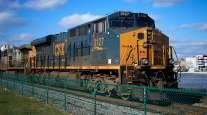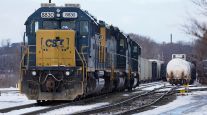Senior Reporter
CSX Reports Strong Q1 Earnings

[Stay on top of transportation news: Get TTNews in your inbox.]
Class I railroad CSX Corp. on April 20 announced first-quarter earnings that beat Wall Street analysts’ expectations.
The Jacksonville, Fla.-based company said Q1 income increased nearly 15% to $987 million, or 48 cents per share, compared with $859 million, 39 cents, in the same period a year ago. Revenue for the quarter increased 8.8% to $3.71 billion compared with $3.41 billion a year ago.
Analysts polled by Zacks Investment Research were expecting EPS of 42 cents per share on revenue of $3.6 billion.
The railroad’s operating ratio improved to 60.5 from 62.4 a year ago. Operating ratio, or operating expenses as a percentage of revenue, is used to measure efficiency. The lower the ratio, the greater the company’s ability to generate profit.

Hinrichs
CSX said its Q1 results included a $42 million charge tied to union contract negotiations that included 24% raises along with bonuses for workers.
“CSX had an encouraging start to the year as the efforts of our dedicated railroaders resulted in strong earnings growth,” new CEO Joe Hinrichs said in a statement.
Hinrichs in September left a two-decade career at Ford Motor Co. to join CSX after losing out on the CEO job to Jim Farley. CSX is the nation’s third-biggest railroad by revenue, and this job is Hinrichs’ first at a railroad. The CSX board of directors chose him because he brought an outsider’s perspective to the company and an industry struggling with personnel, safety and service issues.

In a recent Bloomberg interview, Hinrichs said he wants to repair broken relations with union workers and customers and provide consistent, reliable service that will attract more freight customers to the rails. U.S. railroads hauled 25.4 million rail cars last year, down 13% from a 2006 peak year.
“Our emphasis is on the employees and the customer service,” Hinrichs said. “If we take care of the employees and they’re engaged and excited and motivated to deliver great service to our customers, the shareholders will be rewarded for that.”
Hinrichs said it’s essential to motivate employees sapped by layoffs, onerous work rules and acrimonious labor negotiations that required Congress to intervene in December to avoid a strike.
CSX recently announced an agreement with the Sheet Metal, Air, Rail and Transportation Workers-Mechanical Department, SMART-MD, to provide paid sick leave benefits.
“This agreement with our SMART-MD workers marks the ninth such agreement and is a demonstration of our commitment to our railroaders. I greatly appreciate the SMART-MD leadership for working with us on this agreement as we continue building momentum and create a more positive work environment for our employees,” Hinrichs said at the time of the announcement.
The issue of paid sick time became a contentious one during recent contract talks between Class I carriers and various unions, and threatened to stall a larger, multiyear labor agreement that could have resulted in a nationwide rail strike.
Want more news? Listen to today's daily briefing above or go here for more info
During Q1, CSX reported gains in all but one of its business units. Chemical shipment revenue rose 5% annually to $650 million compared with $618 million a year ago, while agriculture and food product revenue jumped 13% to $437 million from $387 million in the first quarter of 2022. Automotive revenue soared 21% to $274 million from $227 million in the previous year, while mineral shipment revenue increased 20% to $173 million from $144 million.
Forest products notched upward by 14% to $261 million from $228 million, while metals and equipment reported a 21% increase to $239 million from $197 million. Fertilizer shipment revenue saw an 8% hike to $129 million from $120 million. Coal saw a 19% year-over-year revenue hike to $633 million from $533 million
Trucking revenue increased 1% to $233 million from $230 million.
Intermodal revenue declined year-over-year by 9% to $654 million from $722 million.




